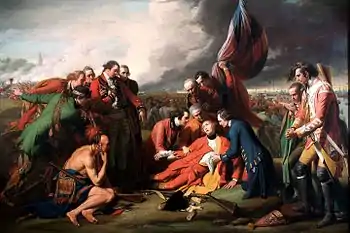1775 in Canada
| Years in Canada: | 1772 1773 1774 1775 1776 1777 1778 |
| Centuries: | 17th century · 18th century · 19th century |
| Decades: | 1740s 1750s 1760s 1770s 1780s 1790s 1800s |
| Years: | 1772 1773 1774 1775 1776 1777 1778 |
| Part of a series on the |
| History of Canada |
|---|
| Timeline |
| Historically significant |
| Topics |
| By Provinces and Territories |
| See also |
|
Events from the year 1775 in Canada.
Incumbents
Governors
- Governor of the Province of Quebec: Guy Carleton
- Governor of Nova Scotia: Lord William Campbell
- Commodore-Governor of Newfoundland: John Byron
- Governor of St. John's Island: Walter Patterson
Events
- April 19 – The American War of Independence begins, at Concord and Lexington, Massachusetts.
- May 1 – A bust of George III is found, in Montreal, adorned with beads, cross, and mitre, with the words "Pope of Canada: Sot of England." A reward of 500 guineas does not lead to apprehension of the culprit.
- May 10 – Ethan Allen takes Fort Ticonderoga.
- June 9 – Martial law is proclaimed in Canada.[1]
- August 21 – Generals Schuyler and Richard Montgomery, with 1,000 Americans come to Canada, and invite the inhabitants to rebel.
- September 17 – Montgomery besieges St. Johns.
- September 25 – Attempting to take Montreal, Ethan Allen and many of his 150 followers are captured, at Longue Pointe, and are sent to England.
- October 18 – The Americans capture Chambly.
- October 25 – On Benedict Arnold's expedition to Quebec from New England, his force begins crossing the height of land between Maine and Canada for the descent to the St. Lawrence River.
- November 3 – Hindered by Colonel Warner, of Vermont, Governor Guy Carleton cannot relieve St. Johns, which surrenders to Montgomery.
- November 12 – General Montgomery tells Montrealers that, being defenceless, they cannot stipulate terms; but promises to respect personal rights. He demands the keys of public stores, and appoints 9 a.m. tomorrow for the army's entrance, by the Recollet gate. (see "Nov 12, 1775 Articles of Capitulation" in Historical Documents, below)
- November 13 – The invaders appropriate royal stores.
- December 31 – At the Battle of Quebec, British forces repulsed an attack by the Continental Army to capture Quebec City and enlist French Canadian support.
- Having captured Montreal, American troops fail to take Quebec City or elicit local support, and withdraw within a year.
Historical Documents
Continental Congress letter to Canadians, May 26, 1775 (two sources)[2]
Gen. Richard Montgomery letter re Chambly capitulation, officers and stores captured, etc. (two sources; note: "St. John's" is Saint-Jean-sur-Richelieu)[3]
Gen. Montgomery letter re St.-Jean surrender and capitulation terms, stores captured, etc.[4]
Col. Benedict Arnold's bedraggled regiment arrives at Quebec City from Maine, November 8, 1775[5]
Defenceless Montreal citizens' capitulation terms rejected by Gen. Montgomery[6]
Births
- April 13 or 16 – Charles James Stewart, clergyman of the Church of England, bishop, and politician (d.1837)
- April 25 – William Warren Baldwin, doctor, militia officer, jp, lawyer, office holder, judge, businessman, and politician (d.1844)
- May 24 – Matthew Whitworth-Aylmer, 5th Baron Aylmer, army officer and colonial administrator (d.1850)
- September 13 – Laura Secord, heroine of the War of 1812 (d.1868)
- November 28 – Jean-Charles Létourneau, politician (d.1838)
Deaths
- January 3: Robert Campbell, merchant and political figure in Nova Scotia. (b.1718)
- November 3: Juan José Pérez Hernández, naval officer and explorer (b. ca. 1725)
References
- Greenwood, Frank Murray; Wright, Barry (15 December 1996). Canadian State Trials Volume I: Law, Politics, and Security Measures, 1608-1837. University of Toronto Press. p. 139. ISBN 978-1-4875-9790-0.
- "Letter to the oppressed inhabitants of Canada," Journals of Continental Congress, Volume II, pages 68–70 (May 29, 1775). Accessed 8 October 2017 https://en.wikisource.org/wiki/Letter_to_the_oppressed_inhabitants_of_Canada and "Philadelphia, June 14. In Congress, May 26, 1775. To the Oppressed Inhabitants of Canada," The New-England Chronicle: or, The Essex Gazette, Volume VII, Number 361 (June 22–29, 1775), pg. 2, The Coming of the American Revolution 1764–1776, Massachusetts Historical Society. Accessed 8 October 2017. http://www.masshist.org/revolution/image-viewer.php?item_id=956&img_step=1&tpc=&mode=transcript&tpc=#page1
- Richard Montgomery and Continental Congress Broadside Collection, "Extract of a letter from General Montgomery, dated camp before St. John's, October 20, 1775" (Philadelphia, 1775), Documents from the Continental Congress and the Constitutional Convention, 1774–1789, Library of Congress. Accessed 8 October 2017 http://memory.loc.gov/cgi-bin/query/r?ammem/bds:@field(FLD001+90898003+) and "Extract of a Letter from General Montgomery, dated Camp before St. John's, October 20, 1775" Accessed 8 October 2017 http://www.canadahistory.com/sections/documents/usrelations/letterstjohns.htm
- "Extract of a Letter from Gen. Montgomery, dated Camp near St. John's, Nov. 3, 1775" Accessed 8 October 2017 http://www.canadahistory.com/sections/documents/usrelations/letterstjohnsii.htm
- Abner Stocking, An interesting journal of Abner Stocking of Chatham, Connecticut (Catskill, N.Y.: Eagle Office, 1810; reprint, N.Y.: W. Abbatt, 1921), pgs. 149-50. Accessed 8 October 2017 https://iiif.lib.harvard.edu/manifests/view/drs:2581271$22i
- "Nov 12, 1775 Articles of Capitulation" Accessed 8 October 2017 http://www.canadahistory.com/sections/documents/usrelations/capitulationmontreal.htm
This article is issued from Wikipedia. The text is licensed under Creative Commons - Attribution - Sharealike. Additional terms may apply for the media files.
